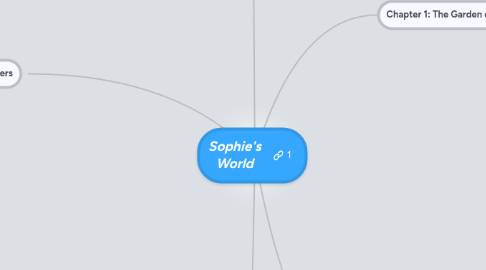
1. Chapter 3: The Myths
1.1. Philosophy means that there is a new way of thinking of how everything evolved.
1.1.1. 600 years before the birth of Christ.
1.2. Philosophical explanation for why it rains
1.2.1. Thor was known to create thunder and lightening by hitting his hammer in the sky.
1.2.1.1. "Thunder is 'aska...' which means 'god's journey' over the heavens" (24).
1.2.1.2. When there was thunder and lightening, there was rain.
1.2.1.3. Hammer did more than make it rain. It caused chaos, which gave Thor unlimited power.
1.2.1.3.1. This explains why there is a constant battle between good and evil.
1.2.2. "The mythological explanation for rain was therefore that Thor was swinging his hammer" (24).
1.2.3. Sophie creates her own story for why it rains, where the snow goes, and why the sun rises in the morning.
1.2.3.1. "Winter held the land in its icy grip because the evil Muriat had imprisoned the beautiful Princess Sikita in a cold prison. But one morning the brave Prince Bravato came and rescued her. Sikita was so happy that she began to dance over the meadows, singing a song, she had composed inside the dank prison. The earth and the trees were so moved that ll the snow turned to tears. But then the sun came out and dried all the tears away. The bird imitated Sikita's song, and when the beautiful princess let down her golden tresses, a few locks of her hair fell onto the earth and turned the lilies of the field..." (29).
1.2.3.2. Sophie feels that people always need to explain how nature works. Why do people need these explanations?
2. Chapter 4: The Natural Philosophers
2.1. "Is there a basic substance that everything else is made of? Can water turn into wine? How can earth and water produce a live frog?" (31).
2.2. Natural Philosophers
2.2.1. Greeks were considered natural because they studied the natural world and its process.
2.2.2. "So philosophy gradually liberated itself from religion. We could say that the natural philosophers took the first step in the direction of scientific reasoning, thereby becoming the precursors of what was to become science" (33).
2.3. Thales
2.3.1. He believed that the source of all things comes from water, and that all life returns to its main source, water.
2.3.2. "All things are full of gods" (34).
2.3.2.1. Everything must come from something.
2.3.3. Anaximenes believed the same as he did, all things came from air or vapor. (Theory of water).
2.4. Anaximander
2.4.1. He thought that our was a world where everything evolved and dissolved in something named "boundless."
2.5. Nothing can come from nothing.
2.5.1. Philosophers also believed that everything that exists has always existed.
2.5.2. All things flow, everything is changing and and constantly moving.
2.5.3. Four Basic Elements
2.5.3.1. Parmenides
2.5.3.1.1. "Nothing can change, and our sensory perceptions must therefore be unreliable" (37).
2.5.3.2. Heraclitus
2.5.3.2.1. "Everything changes and our sensory perceptions are reliable" (37).
2.5.4. Everything has an opposite: love and strife, substance and force, fire and water.
2.6. Something of Everything in Everything
2.6.1. Anaxagoras believes that everything has smaller parts to it. "...that nature is built up of an infinite number of minute particles invisible to the eye. Moreover, everything can be divided into smaller parts, but even in the minutest parts there are fragments of other things" (40).
3. Chapter 11: Aristotle
3.1. No Innate Ideas
3.1.1. Everything exists for a reason.
3.1.2. Our consciousness realizes that things that exist and why they exist.
3.2. The Form of a Thing; Specific Characteristics
3.2.1. The form is is what it does.
3.2.1.1. A chicken flutters it wings.
3.2.2. The substance is what it is.
3.2.2.1. A chicken is in egg shape.
3.2.3. Things have the potentiality to be a different form; the chicken can be an egg, omelette, scrambled eggs.
3.3. The Final Cause
3.3.1. Everything has four causes.
3.3.1.1. Material Cause
3.3.1.1.1. What is actually is doing.
3.3.1.2. Efficient Cause
3.3.1.3. Formal Cause
3.3.1.3.1. What it actually is.
3.3.1.4. Purpose
3.3.1.4.1. Why it is there.
4. Chapter 1: The Garden of Eden
4.1. 1st letter in mailbox appears. "Who are you?" (4).
4.1.1. Sophie responds to the question. "I am Sophie Amundsen" (5). She never really thought about who she really was before.
4.1.2. Looks in the mirror to realize she doesn't know who she truly is.
4.2. 2nd letter in the mailbox appears minutes later. "Where does the world come from?" (7).
4.2.1. Sophie has never been asked this question before and does not know a reasonable response. "For the first time in her life she felt it wasn't right to live in the world without at least inquiring where it came from" (7).
4.3. "Garden of Eden" symbolizes the Garden of Eden in "The Holy Bible." Sophie starts in the garden innocent and never questioning, as Adam and Eve did, but as soon as she starts to ask questions, she is like Eve biting from the fruit of knowledge.
5. Chapter 2: The Top Hat
5.1. Receives a packet of information in her mailbox entitled: Course in Philosophy. Handle with Care.
5.1.1. What is philosophy?
5.1.1.1. "The best way to approach philosophy is to ask a few philosophical questions: How was the world created? Is there any will or meaning behind what happens? Is there life after death?" (15).
5.1.2. Philosophers search for their own answers and what they think is the truth.
5.1.3. Life is like a magic trick.
5.1.3.1. The world is like a rabbit being pulled out of a hat. We, humans, sit on the hairs of the rabbit not understanding anything, but slowly as life goes on we learn more and soak into the hair thinking we understand how life works.
5.1.3.1.1. Philosophers are the ones who understand, or try to understand, how the world works, and slowly they drift back up to being right on top of the rabbit's fur.
5.1.4. "All philosophical questions concern us all" (19).
